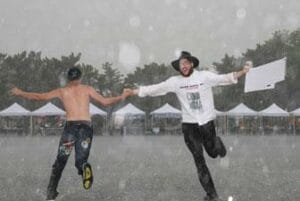Like most Jews in the former Soviet Union, Avigdor Roppoport grew up in a secular home. He went through life uncircumcised not by choice, but by culture.
When he was in his 20s, it was something he yearned to change.
“I decided a long time ago when I lived in Moscow, but there wasn’t an opportunity,” said Mr. Roppoport, now 45 and a Rockville resident since 1990.
In the United States, society wouldn’t stand in his way. So in December 2003, he embraced the rite.
“From a religious point of view, it’s very important,” Mr. Roppoport said. “It’s a very big step.”
The ritual goes back thousands of years to Genesis 17:10, where God said to Abraham: “This is my covenant, which ye shall keep, between me and you and thy seed after thee; Every man child among you shall be circumcised.”
Russian immigrants of all ages and levels of observance have acted on these beliefs. For decades under the communist regime, many had pondered where, when and how they could make this critical leap.
“For a Jewish man, it’s axiomatic to be circumcised. It’s part and parcel of the identity. It has been for thousands of years and will continue to be so in the future,” said Rabbi Shmuel Herzfeld of Ohev Sholom Talmud Torah, an Orthodox synagogue in Northwest.
Under Soviet rule, some parents went to great lengths to circumcise under utmost secrecy. One woman took her newborn to the cemetery at night, alone, and performed the ritual herself. She followed ancient custom by carrying it out on his eighth day of life just as generations had done.
“There are many stories like that,” said Rabbi Tshi Schur of Jewish Family Services in Baltimore.
“Circumcision was forbidden,” he said. “It was against Soviet law because it was a religious act.”
Now in the United States, many immigrants say it’s better late than never, pointing out that Abraham, ancestor of the Jewish people, circumcised himself at age 99.
Among immigrants, the decision often crystallized after decades of deliberation and gradual acceptance of religious practices.
“Their fears were very real. It’s a serious operation,” said Mr. Herzfeld, who has counseled Russian Jews on ritual circumcision. “We shouldn’t minimize the possibility of pain that people will be feeling.”
Circumcision offers several health benefits, said Dr. Marc Goldstein, professor of urology and chief male reproductive surgeon at New York Weill Cornell Medical Center. Dr. Goldstein has performed circumcisions on many adult Russian Jews.
The incidence of HIV/AIDS and other sexually transmitted diseases is higher among uncircumcised men, he said, because bacteria and viruses thrive in the membranes under the foreskin. An uncircumcised partner is more likely to harbor the human papillomavirus, which can cause cervical cancer in women.
Dr. Goldstein also said that the risk of penile cancer in uncircumcised males is significantly higher, about 2 percent compared with almost none in the circumcised population. “It’s an absolutely devastating cancer for men to get,” he said.
For circumcision to be deemed valid under Jewish law, it must be performed in a certain manner. A rabbi known as a “mohel” typically undertakes the ritual with a urologist present.
Those who don’t have easy access to a mohel shouldn’t despair, said Yosef Y. Okunov, the 25-year-old New York program director at Friends of Refugees of Eastern Europe (FREE), a Lubavitch-affiliated organization that assists Russian immigrants with spiritual and material needs.
Mr. Okunov’s grandfather was arrested for his Jewish involvement and held captive in Siberia. His father, Rabbi Mayer Okunov, vowed to spare future generations and became chairman of FREE.
Since its founding in 1969, the organization has coordinated the circumcisions of more than 13,000 ex-Soviet Jews, the oldest at 82. Private donations allow the service to be provided at no cost.
In Mr. Roppoport’s case, FREE paid for a room in the Crown Heights area of Brooklyn, N.Y., where he stayed for three days after traveling from Rockville before Hanukkah in 2003.
The telecommunications businessman stumbled upon the organization on the Internet. It was the only place where he came across information on ritual circumcision in Russian.
“For Americans, it’s difficult to understand why someone hasn’t done it yet,” Mr. Roppoport said.
Circumcision instilled pride in his Jewish heritage. “Gradually,” he said, “I’m trying to become Orthodox.”
Valeriy Kozlov echoes these sentiments. Two months shy of his 59th birthday, he was circumcised.
The Belarus native emulated his friend Leonid Marder, a Russian immigrant who was circumcised at age 66 and is now 70. Both became devout after resettling in the Baltimore suburb of Reisterstown home to thousands of ex-Soviet Jews.
“As with any operation, a person is afraid of blood of being cut,” Mr. Kozlov said. “But when a person becomes more spiritual, he understands that physical pain is less significant.”
Mr. Kozlov credits his inspiration to Rabbi Mayer Pasternak of Aish Hatorah Village Shul in Owings Mills, Md., and Yakov Krug, a friend who awakened his passion for Judaism and encouraged him to proceed with circumcision.
“It was a criminal act in Russia at that time. They jailed people for much less,” said Mr. Krug, 36. At 17, he secretly underwent circumcision in Leningrad, now known by its pre-Bolshevik name of St. Petersburg. His parents didn’t hear about it until the next day.
Mr. Krug said he hopes others will embrace this spiritual commitment, even in their golden years. Freedom from oppression makes this possible without the specter of fear looming.
“It’s never too late to change the course of life,” he said, “and ask yourself a question: ‘What am I doing in this world and why am I here?'”




